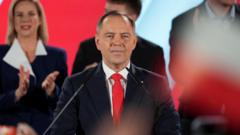**The newly signed trade deal aims to enhance exports, reduce tariffs, and provide higher-quality goods for consumers.**
**EU Strengthens Ties with South America Through New Trade Agreement**

**EU Strengthens Ties with South America Through New Trade Agreement**
**The European Union solidifies economic relations with South American countries amid global trade tensions.**
In a significant move to foster economic collaboration, the European Union has finalized a trade agreement with four major South American nations: Argentina, Brazil, Paraguay, and Uruguay. European Commission President Ursula von der Leyen hailed the agreement as a "truly historic milestone" designed to navigate an increasingly confrontational global landscape.
This latest agreement comes after a prior deal reached in 2019 failed to gain traction due to hesitance among EU member states to ratify it. Should this new deal achieve ratification, it promises to lower tariffs on traded goods between the two regions, streamline customs processes, and enhance the EU's access to essential raw materials.
While addressing reporters in Montevideo, von der Leyen emphasized the benefits for European citizens, stating that the deal contributes to creating more jobs, offering an array of choices, and improving pricing structures. In the past year, the EU exported nearly $59 billion worth of goods to the South American partners, boasting exports of vehicles, machinery, pharmaceuticals, and chemicals. Conversely, South America exported approximately $57 billion in goods to Europe, with a focus on minerals critical for electric vehicle batteries, including lithium and nickel.
The agreement, which encompasses about 700 million consumers and 20% of the global economic output, is anticipated to enhance market growth for both regions. The EU aims to facilitate trade for 60,000 companies exporting to Mercosur nations, with a notable portion consisting of small businesses. The Mercosur bloc, which includes Argentina, Brazil, Paraguay, and Uruguay, has been in discussions for trade agreements since 2000.
Despite the progress made, challenges remain. Notably, reservations from various EU countries, including France, Italy, and Poland, are surfacing due to concerns over environmental standards and competitive fairness for agricultural sectors. French Trade Minister Sophie Primas clarified via social media that while negotiations are moving forward, the agreement remains politically binding rather than legally binding until member states approve it.
Uruguay's President Luis Lacalle Pou, who facilitated the concluding discussions, recognized the vital importance of the deal for the economies of Mercosur, even as he acknowledged hurdles that require addressing. Meanwhile, Germany's commitment to capitalize on foreign trade opportunities is underscored in light of its exporters facing struggles amid economic headwinds, with a spokesperson describing the agreement as "a unique opportunity."























